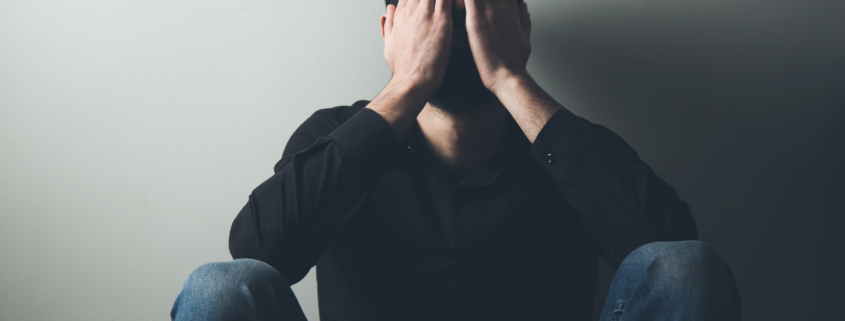Panic Attacks After Drinking
Table of Contents
If you have experienced panic attacks after drinking alcohol you may be wondering why this is occurring. Since alcohol is known as a depressant, it is hard to understand how drinking could trigger a panic attack. To learn more about the panic attacks you are having after drinking, please read on.
What Are Panic Attacks?
A panic attack is a form of anxiety that features an episode of intense fear alongside a cascade of physical symptoms. These attacks often occur without warning. Suddenly, out of nowhere, you feel absolutely panicked with no apparent trigger, and with symptoms that mimic a heart attack.
Symptoms of a panic attack might include:
- Shortness of breath
- Excessive sweating
- Lightheadedness
- Dizziness
- Trembling
- Racing heart
- Feelings of impending doom
- Chest pain or tightening
- Sense of a loss of control
- Feeling detached from reality
How Does Alcohol Cause Panic Attacks?
As a central nervous system depressant, drinking alcohol will cause a calming effect. This occurs due to the increased levels of the neurotransmitter called GABA when you consume alcohol. GABA causes the neural activity in the central nervous system to slow down, which causes relaxation with moderate alcohol intake.
However, when someone consumes higher amounts of alcohol it can have the opposite effect and actually reduce GABA. This results in an increase in anxiety. Along with the reduced GABA levels, here are some other ways that alcohol can contribute to panic attacks:
- Dehydration. You can become dehydrated while drinking alcohol, which is a diuretic. If you do not drink enough water it can cause feelings of dizziness and a racing heart rate.
- Lowered blood sugar. Blood sugar levels are reduced after drinking alcohol, which can trigger anxiety. This effect can last all night long, contributing to “hangxiety” the next morning.
- Affects hormones. Alcohol can raise your serotonin levels, the feel-good hormone, temporarily. As the effects of alcohol wane, the serotonin levels decline, which can result in feelings of anxiety.
- Pre-existing anxiety disorder. Sometimes the anxiety and drinking become a vicious cycle. Someone who has an existing anxiety disorder may drink to subdue the symptoms, which then leads to a panic attack.
- Alters brain pathways. A study out of UNC found that chronic high alcohol consumption alters brain pathways. The study results imply that heavy drinking may induce anxiety due to a molecular connection between anxiety and alcoholism.
How to Reduce Panic Attacks After Drinking Alcohol
The best way to reduce the chances of having a panic attack after drinking is to consider giving up alcohol altogether. If you don’t feel you have an alcohol problem, here are some other things you can do to help avoid a panic attack:
- Be sure to drink a lot of water when you are consuming alcohol. Staying hydrated will reduce the effects of alcohol withdrawal.
- Have a full stomach before you begin drinking alcohol. Having something in the stomach helps to reduce the intoxicating effects of the alcohol.
- Keep track of how much you are drinking to avoid consuming too much in one sitting.
Signs of Alcohol Use Disorder
You may have developed co-occurring alcohol use disorder due to self-medicating an anxiety disorder. This happens as tolerance to the effects of the alcohol increase and you need to consume more to get the calming effects. Over time, alcohol dependency or addiction can take hold.
Here are the classic signs of alcohol use disorder:
- You are unable to limit your alcohol intake
- You prioritize drinking, and are obsessed about obtaining alcohol
- You start to have memory blackouts
- You experience alcohol cravings
- You hide alcohol or lie about how much you drink
- You ignore family and work obligations
- You miss work frequently due to hangovers
- You continue drinking despite the mounting problems it causes
- You engage in high-risk behaviors, such as driving under the influence
- You sustain injuries due to drinking, such as from getting in fights or falling
- You neglect your appearance or hygiene
- You withdraw socially
- You need to drink more to get the desired effects
- You attempt to reduce or stop drinking but cannot
- You have withdrawal symptoms when the effects of alcohol wear off
Alcohol Addiction Support Options
If you believe you have a drinking problem that is contributing to the panic attacks, it is important to seek support and treatment. A dual diagnosis rehab program will address the anxiety disorder while helping you develop the skills to remain sober.
Treatment will involve the following:
- Detox. The detox process is the first step in recovery. During alcohol detox, a trained detox team will provide medications to manage the withdrawal symptoms.
- Psychotherapy. In one-to-one therapy, evidence-based therapies like CBT and DBT will help you change dysfunctional behavior patterns.
- Group therapy. Group sessions provide a supportive space to discuss recovery-related topics.
- Family therapy. Family group sessions provide opportunities for members to discuss family issues and learn how to support their loved one in recovery.
- A.A. 12-step program. The 12-step program provides structure and benchmarks in early recovery and beyond.
- Education. Classes provide you with new recovery skills to help you avoid a relapse. Classes also teach about the science of addiction, which can act as a deterrent to relapse.
- Health and wellness. Holistic methods help reduce stress in rehab and may include grounding exercises, yoga, mindfulness, breath-work, and nutritional counseling.
Because panic attacks can be a symptom of alcohol withdrawal, it makes sense to reduce or quit alcohol intake. Rehab can help you accomplish this. Also, if you are prone to panic attacks, you may have a preexisting undiagnosed anxiety disorder that needs to be addressed and treated.
Annandale Behavioral Health Provides Dual Diagnosis Treatment for Anxiety and Alcohol Use Disorder
Annandale Behavioral Health is a luxury rehab center that treats co-occurring trauma and anxiety disorder. If you are regularly experiencing panic attacks after drinking alcohol, our clinical team is here to help. Please reach out today at (858) 778-8668.







